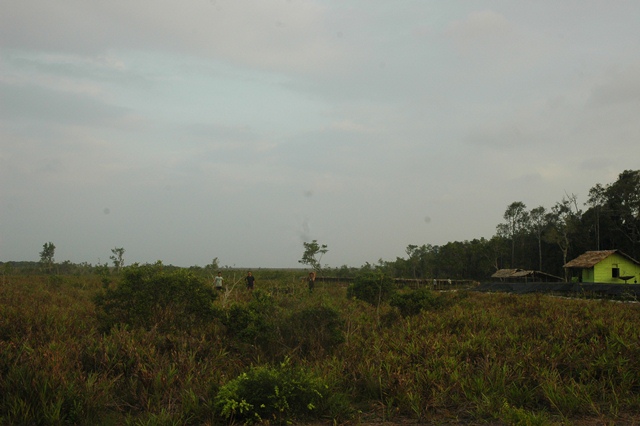 We stand looking out over a desolate landscape of white sand and low, stunted shrubs. Nothing moves except for the small bushes which are stirred by a hot wind that sweeps and moans across this desert. You half expect a lion or a giraffe to walk into view, or for the Lone Ranger to ride up on a thirsty and exhausted horse.
We stand looking out over a desolate landscape of white sand and low, stunted shrubs. Nothing moves except for the small bushes which are stirred by a hot wind that sweeps and moans across this desert. You half expect a lion or a giraffe to walk into view, or for the Lone Ranger to ride up on a thirsty and exhausted horse.
But this is not the desert savannah of Africa or the plains of the western US. It’s Río Lamandau Reserva de Vida Silvestre, Central Kalimantan on the island of Borneo, more associated with lush tropical rain forest, than arid desert scrub.
And of course this was once a green tropical paradise, vibrant with plant-life, animals, insects and birds.
Until, that is, the loggers came, to clear-cut the forest for the timber that we crave, and apparently can’t do without. That was many years ago, y desde entonces esta inmensa zona ha permanecido en estado latente, y sin usar. Una fea cicatriz en la cara de la tierra.
Bajo la ley de Indonesia, se requiere que los registradores para replantar los árboles que han cortado, pero esto se elude fácilmente, a menudo mediante el cierre de la empresa original, y comenzar de nuevo en otro lugar en los bosques.
Basado en el éxito de FNPF (Amigos de la Fundación de Parques Nacionales) proyectos de reforestación en otras partes de Kalimantan Central, Bayu and his team have been invited by the local government to open a centre here in Lamandau, para iniciar el proceso de volver a reverdecer el desierto.
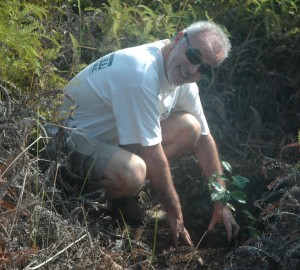 Estábamos en una visita de 4 días para ver el progreso de los esfuerzos de FNPF para replantar árboles aquí en Kalimantan Central, en zonas cercanas Tanjung Puting Parque Nacional. The team includes FNPF Director and Founder Bayu Wirayudha; Michael Kennedy, Director and Co-Founder of HSI Australia (Humane Society International Australia), a key FNPF donor, y Lily Wardoyo, an FNPF Ubud volunteer.
Estábamos en una visita de 4 días para ver el progreso de los esfuerzos de FNPF para replantar árboles aquí en Kalimantan Central, en zonas cercanas Tanjung Puting Parque Nacional. The team includes FNPF Director and Founder Bayu Wirayudha; Michael Kennedy, Director and Co-Founder of HSI Australia (Humane Society International Australia), a key FNPF donor, y Lily Wardoyo, an FNPF Ubud volunteer.
FNPF has several replanting sites near the Tanjung Putting National Park. The oldest of these is at Pesalat, where FNPF has been busy planting tree saplings for the past 7 años. The results are heart-warming, and spectacular.
En nuestra reciente visita una bandada de cálaos negro cruzó el bosque joven, y otras especies de aves revoloteaban de árbol en árbol. El bosque Pesalat es también el hogar de ciervos y cerdos, y otros animales, y lo más emocionante de todo, orangután, who come here to feed on fruit from the replanted trees. Bayu showed us the remains of fruit eaten by orangutan, y explicó que se sienten seguros para entrar en la zona de replantación, even though they must spend some time on the ground as they traverse the forest.
As with other FNPF sites in Kalimantan, hay una oficina con alojamiento para los trabajadores y voluntarios. El uno en Pesalat es particularmente agradable, surrounded by shady trees, and a nursery for saplings of many different tree species.
FNPF has other replanting sites at Beguruh, donde se puede subir a una torre de observación de fuego para ver el desarrollo de los bosques replantados abajo, y Nueve Padang, un sitio más nuevo en una zona de la antigua agricultura y los campos de cultivo de arroz, where the tiny saplings must compete with ferns and other vegetation that makes this a particularly challenging replanting task.
At Jerumbun, FNPF is encouraging staff and local villagers to experiment with agro-forestry crops, such as rubber, gaharu and watermelons. This area buffers the river from a large palm-oil plantation, and the day before our visit, un incendio había visto personal FNPF corriendo para evaluar los daños, y para estar listo para pelear las llamas, si es necesario.
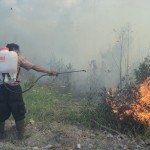
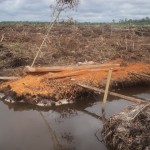
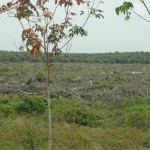 Fores t fires, some set deliberately, particular ly near p alm-oil plantations, are a constant source of worry for FNPF. Several developi ng forest areas have been damaged by fires, and it is heartbreaking for FNPF workers to see trees that they have nurtured for years, destroyed in the blink of an eye.
Fores t fires, some set deliberately, particular ly near p alm-oil plantations, are a constant source of worry for FNPF. Several developi ng forest areas have been damaged by fires, and it is heartbreaking for FNPF workers to see trees that they have nurtured for years, destroyed in the blink of an eye.
A young orangutan was spotted at Jerumbun during our visit, pero rápidamente huyó al bosque cercano. The potential conflict between man and orangutan was illustrated graphically by the sight of young rubber trees, planted as cash-crops by villagers, where the bark had been chewed off by the animals.
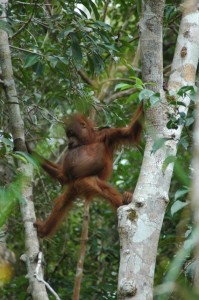 Todo el trabajo de replantación realizada por FNPF se ha traducido en un importante cuerpo de conocimiento sobre la mejor manera de llevar a cabo esta importante labor, and the spirit of experimentation has infused the work of Bayu and his team.
Todo el trabajo de replantación realizada por FNPF se ha traducido en un importante cuerpo de conocimiento sobre la mejor manera de llevar a cabo esta importante labor, and the spirit of experimentation has infused the work of Bayu and his team.
They now know the best tree species for different soil, climate and vegetation conditions; the optimal interval to leave between saplings and other vegetation; the best season to plant, and so on.
As with any land-use issue, though, there are abundant potential conflicts with the various stakeholders, and in Central Kalimantan they include the local communities, palm-oil companies, logging both legal and illegal, gold miners, el gobierno local, e incluso otras ONG. Es de vital importancia que estas diversas partes interesadas apoyan, o al menos no se lo impidan, the work of FNPF.
At the nearby village of Tanjung Harapan we visited a small house that will be used as a library for the village children to learn about their environment, and the importance of preserving the local forests.
FNPF is also supporting village ecotourism and agroforestry initiatives in Tanjung Harapan, encouraging the development of livelihoods that do not depend, like logging and gold-mining, on the unsustainable exploitation of local resources.
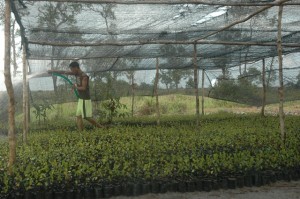
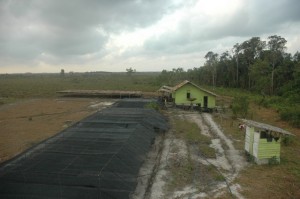 Back at Lamandau, the task is particularly challenging. Not only is the destroyed area a large one, but the soil, and climatic conditions are unfavourable. The soil in many places is simply white sand.
Back at Lamandau, the task is particularly challenging. Not only is the destroyed area a large one, but the soil, and climatic conditions are unfavourable. The soil in many places is simply white sand.
FNPF have made a great start, however. The office and centre nestles in the lee of a sliver of surviving forest, which holds an all-important water supply, rare in this area. Replanting has already started, and tiny saplings reach for the sky around the FNPF center. La experimentación por el equipo FNPF ha demostrado que arbolitos injertados de los árboles más grandes crecen más rápido, y son más fuertes una vez plantada, and this promises to speed up the planting process.
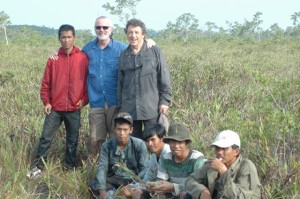 It is hard, now, to see this blighted land being transformed into a sea of green. But with the willpower and experience of Bayu and his FNPF team, and the support of generous and far-sighted donors, such as Humane Society International, The Boeing Corporation and Taronga Zoo, the vision will become reality.
It is hard, now, to see this blighted land being transformed into a sea of green. But with the willpower and experience of Bayu and his FNPF team, and the support of generous and far-sighted donors, such as Humane Society International, The Boeing Corporation and Taronga Zoo, the vision will become reality.
As Michael Kennedy of HSI said after his recent visit, “Los trabajos de rehabilitación de bosques de FNPF es verdaderamente inspirador. Their commitment to protecting Tanjung Puting National Park is second to none, and we are very proud to be associated with their on-going conservation achievements.”
Eden Recreated
Restauración de bosques degradados de Kalimantan
By Farquhar Stirling
We stand looking out over a desolate landscape of white sand and low, stunted shrubs. Nothing moves except for the small bushes which are stirred by a hot wind that sweeps and moans across this desert. You half expect a lion or a giraffe to walk into view, or for the Lone Ranger to ride up on a thirsty and exhausted horse.
But this is not the desert savannah of Africa or the plains of the western US. It’s Río Lamandau Reserva de Vida Silvestre, Central Kalimantan on the island of Borneo, more associated with lush tropical rain forest, than arid desert scrub.
And of course this was once a green tropical paradise, vibrant with plant-life, animals, insects and birds.
Until, that is, the loggers came, to clear-cut the forest for the timber that we crave, and apparently can’t do without. That was many years ago, y desde entonces esta inmensa zona ha permanecido en estado latente, y sin usar. Una fea cicatriz en la cara de la tierra.
Bajo la ley de Indonesia, se requiere que los registradores para replantar los árboles que han cortado, pero esto se elude fácilmente, a menudo mediante el cierre de la empresa original, y comenzar de nuevo en otro lugar en los bosques.
Basado en el éxito de FNPF (Amigos de la Fundación de Parques Nacionales) proyectos de reforestación en otras partes de Kalimantan Central, Bayu and his team have been invited by the local government to open a centre here in Lamandau, para iniciar el proceso de volver a reverdecer el desierto.
Estábamos en una visita de 4 días para ver el progreso de los esfuerzos de FNPF para replantar árboles aquí en Kalimantan Central, en zonas cercanas Tanjung Puting Parque Nacional. The team includes FNPF Director and Founder Bayu Wirayudha; Michael Kennedy, Director and Co-Founder of HSI Australia (Humane Society International Australia), a key FNPF donor, y Lily Wardoyo, an FNPF Ubud volunteer.
FNPF has several replanting sites near the Tanjung Putting National Park. The oldest of these is at Pesalat, where FNPF has been busy planting tree saplings for the past 7 años. The results are heart-warming, and spectacular.
En nuestra reciente visita una bandada de cálaos negro cruzó el bosque joven, y otras especies de aves revoloteaban de árbol en árbol. El bosque Pesalat es también el hogar de ciervos y cerdos, y otros animales, y lo más emocionante de todo, orangután, who come here to feed on fruit from the replanted trees. Bayu showed us the remains of fruit eaten by orangutan, y explicó que se sienten seguros para entrar en la zona de replantación, even though they must spend some time on the ground as they traverse the forest.
As with other FNPF sites in Kalimantan, hay una oficina con alojamiento para los trabajadores y voluntarios. El uno en Pesalat es particularmente agradable, surrounded by shady trees, and a nursery for saplings of many different tree species.
FNPF has other replanting sites at Beguruh, donde se puede subir a una torre de observación de fuego para ver el desarrollo de los bosques replantados abajo, y Nueve Padang, un sitio más nuevo en una zona de la antigua agricultura y los campos de cultivo de arroz, where the tiny saplings must compete with ferns and other vegetation that makes this a particularly challenging replanting task.
At Jerumbun, FNPF is encouraging staff and local villagers to experiment with agro-forestry crops, such as rubber, gaharu and watermelons. This area buffers the river from a large palm-oil plantation, and the day before our visit, un incendio había visto personal FNPF corriendo para evaluar los daños, y para estar listo para pelear las llamas, si es necesario.
Forest fires, some set deliberately, particularly near palm-oil plantations, are a constant source of worry for FNPF. Several developing forest areas have been damaged by fires, and it is heartbreaking for FNPF workers to see trees that they have nurtured for years, destroyed in the blink of an eye.
A young orangutan was spotted at Jerumbun during our visit, pero rápidamente huyó al bosque cercano. The potential conflict between man and orangutan was illustrated graphically by the sight of young rubber trees, planted as cash-crops by villagers, where the bark had been chewed off by the animals.
Todo el trabajo de replantación realizada por FNPF se ha traducido en un importante cuerpo de conocimiento sobre la mejor manera de llevar a cabo esta importante labor, and the spirit of experimentation has infused the work of Bayu and his team.
They now know the best tree species for different soil, climate and vegetation conditions; the optimal interval to leave between saplings and other vegetation; the best season to plant, and so on.
As with any land-use issue, though, there are abundant potential conflicts with the various stakeholders, and in Central Kalimantan they include the local communities, palm-oil companies, logging both legal and illegal, gold miners, el gobierno local, e incluso otras ONG. Es de vital importancia que estas diversas partes interesadas apoyan, o al menos no se lo impidan, the work of FNPF.
At the nearby village of Tanjung Harapan we visited a small house that will be used as a library for the village children to learn about their environment, and the importance of preserving the local forests.
FNPF is also supporting village ecotourism and agroforestry initiatives in Tanjung Harapan, encouraging the development of livelihoods that do not depend, like logging and gold-mining, on the unsustainable exploitation of local resources.
Back at Lamandau, the task is particularly challenging. Not only is the destroyed area a large one, but the soil, and climatic conditions are unfavourable. The soil in many places is simply white sand.
FNPF have made a great start, however. The office and centre nestles in the lee of a sliver of surviving forest, which holds an all-important water supply, rare in this area. Replanting has already started, and tiny saplings reach for the sky around the FNPF center. La experimentación por el equipo FNPF ha demostrado que arbolitos injertados de los árboles más grandes crecen más rápido, y son más fuertes una vez plantada, and this promises to speed up the planting process.
It is hard, now, to see this blighted land being transformed into a sea of green. But with the willpower and experience of Bayu and his FNPF team, and the support of generous and far-sighted donors, such as Humane Society International, The Boeing Corporation and Taronga Zoo, the vision will become reality.
As Michael Kennedy of HSI said after his recent visit, “Los trabajos de rehabilitación de bosques de FNPF es verdaderamente inspirador. Their commitment to protecting Tanjung Puting National Park is second to none, and we are very proud to be associated with their on-going conservation achievements.”







